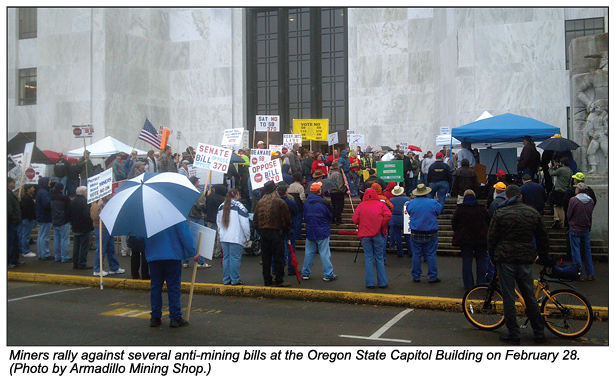Legislation & Regulation
Legislative and Regulatory Update
April 2013 by Scott Harn
• EPA investigated for environmental tiesThe EPA is under investigation for using the “sue and settle” process to circumvent Congress and push through environmental regulations with the assistance of government employees and administrators who share the same ideals.
You’ve read about it many times in the Prospecting and Mining Journal. Environmental groups will sue the federal government in an effort to create or change a policy, create additional restrictions on land or water use, get a species listed as endangered, etc. The government then negotiates a settlement with the environmental groups before the case reaches court, and the government agrees to reimburse the groups for attorney fees and other associated costs related to the case. Radical environmental groups have discovered they can fund their efforts with taxpayer money—without taxpayer involvement—utilizing this method.
This process allows the radical environmentalists to circumvent Congress and the will of the people as they force their ideology on the rest of Americans.
The “sue and settle” process has also been used frequently on the state level. Back in 2006, miners learned that the Karuk Tribe of Northern California had filed a lawsuit against the California Department of Fish & Game in Alameda County Superior Court earlier in the year. Fish & Game was on the verge of signing an agreement with the Karuk Tribe, which would have severely restricted placer mining in the northern part of the state, when the miners intervened.
“Sue and settle” is not limited to the EPA. It is a tool often used by the Forest Service and Bureau of Land Management to get the desired results while circumventing Congress. A simple Internet search for “Forest Service settlement agreement” or “Bureau of Land Management settlement agreement” will reveal dozens of negotiated settlements with environmental groups.
Congressman Darrell Issa (R-California) and Senator David Vitter (R-Louisiana) have been conducting an investigation into the EPA’s use of email aliases and personal email accounts to hide correspondence between EPA employees, administrators and environmental groups. Issa sits on the House Committee on Oversight and Government Reform, while Vitter sits on the Senate Committee on Environment and Public Works.
Former EPA Director Lisa Jackson resigned in December after it was discovered she had been using an email alias of “Richard Windsor” to conduct official business. Emails sent and received under her alias were not included in Freedom of Information Act (FOIA) requests. EPA Region 8 Administrator James Martin resigned shortly after Issa and Vitter announced on January 29, 2013, a joint investigation into Martin’s email practices.
Please take a moment to thank Congressman Issa and Senator Vitter and encourage them to expand their investigation to include the Forest Service, BLM, US Fish & Wildlife and Department of Interior.
Contact Information:
The Honorable Darrell Issa
United States House of Representatives
2347 Rayburn House Office Bldg.
Washington, DC 20515-0549
Ph: (202) 225-3906
Fax: (202) 225-3303
The Honorable David Vitter
United States Senate
516 Hart Senate Office Building
Washington, DC 20510-1804
Ph: (202) 224-4623
Fax: (202) 228-5061
• Hundreds of miners show up to rally at Oregon State Capitol
Hundreds of miners gathered at the Oregon State Capitol Building on February 28 to rally against several recently introduced bills aimed at restricting mining in the state.
Oregon Senator Alan Bates introduced a series of bills aimed directly at placer miners and other landowners in Oregon. SB 401 would designate numerous waterways as “scenic” to restrict suction gold dredging and other methods of placer mining.
SB 370 imposes a $125 fee on placer miners, and would apply to private, state and federal lands, while imposing penalties of 30 days in jail and a $1,250 fine for violations.
SB 115 would outlaw suction gold dredging and prohibit many forms of motorized placer mining in or near waterways. It includes a proposed fine of $6,250 and one year in prison for violations.
SB 12 bans all vehicles with a gross weight of 200 lbs. from any river bank or bed, which would limit access to mining claims.
Gary Earle of Capitol Prospecting in Oregon stated that several senators came out on a rainy day to support the miners.
“I would say it was a very, very successful rally,” said Earle.
Senator Herman Baertschiger Jr. thanked the miners for coming out and expressed his commitment to defeat the bills.
Senator Ted Ferrioli stated, “It’s been said that no man’s property is safe nor life secure so long as the legislature is in session. Now you know what those words mean.”

Ferrioli went on to state, “...I will tell you, as the senior member of the Senate—I’ve been here 17 years—I don’t know of a single, credible scientific study that shows that recreational placer mining harms salmon or fish...
“As a matter of fact, most of the miners in my district tell me anecdotally that the fish kind of like to swim up behind them and eat all the bugs and stuff that come up. This gentleman corrected me and he was right—I said ‘recreational,’ but for many of the folks in my district it’s a business. It’s how they keep their bodies and souls and their families fed. ...When they came after loggers, they didn’t say very much. I did—lots of other people didn’t. What happened to logging?
“The fishermen sort of stood around and watched the logging go away because they were kind of convinced that logging was killing fish. And then we started to draw circles on the ocean, remember? We started to put in ocean reserves. We didn’t learn very much when we started to draw circles on the forest for the spotted owls. We just killed a lot of forest. And guess what? The spotted owls are dying too! So what was wrong with this picture?
“The lesson for me is this: whenever you separate a group of people—an advocacy for a natural resource—the resource dies. Let me repeat that. Whenever you separate people who are in advocacy—like you are for mining—from the natural resource, the natural resource dies.
“Let me just tell you one other thing. Here is something I have confidence in. When a miner gets a permit... and he has to work with the department of Fish and Wildlife and the Division of State Lands, that’s the most regulated guy in the United States of America. And if he has a permit, he’s legal. He’s not harming a thing!
“I’ve been getting lots of mail from you folks and I appreciate that. I will tell you I will be happy to vote ‘no’ on Senate Bill 115, Senate Bill 370, Senate Bill 401, and do everything I can do to help other people understand that this wild and scenic rivers thing is a dodge. And other people, besides miners, are going to be hurt if this passes.”
Additional constructive comments were presented by Tom Kitchar, president of the Waldo Mining District, local radio host and property rights advocate Kerby Jackson, and Les Berg of JOBE Wholesale.
• DOI nominee would be bad for miners
Department of Interior Secretary nominee Sally Jewell stated she would strive to balance resource development and conservation if she is confirmed by the Senate, but her recent track record tells a different story.
Jewell has a degree in mechanical engineering and worked for the oil industry for four years after college, then moved on to commercial banking. In 1996, Jewell joined the board of REI, a recreational equipment company, and was named CEO in 2000.
REI has become a leader in supporting environmental causes under Jewell. In 2011, REI gave $4.5 million to over 330 local and national environmental groups. The usual anti-mining groups are on the list, such as the Wilderness Society and the Wildlands Conservancy. She has publicly declared her support for carbon taxes and global warming.
Jewell sits on the board of directors for the National Park Conservation Association, which has sued the federal government over numerous environmental issues, and she has been honored by the Audubon Society with the “Rachel Carson Award” for her leadership and dedication to conservation.

PLP Update
We are in the planning stages for our next trip to DC. Clark and I are looking at returning after the mid-term elections, probably around the end of November or early December, to continue discussions with members of Congress…
Ask The Experts: Should I take my claim access problems to the Desert Advisory Council?
Q: The nearest access to the claim is a half mile walk, which is tough for a lode claim.
Legislative and Regulatory Update
• US Supreme Court declines to hear dredging controversy
• Why Senate Bill S3422 is bad for America
• Comment deadline extended for new California dredging regulations
Mining Districts: A Short Review of Legal Authorities
Mining Districts are the private regulatory authority granted by Congress recognized to regulate the mineral lands held by the United States and for the disposal to citizens of the United States, by means of development and potentially perfected by patent.
Representative Manweller Lends a Hand in Washington State
We're done watching as an unelected and unchecked bureaucracy, with rule-making authority, enforcement powers, and seemingly bottomless budgets abuses citizens at will.
Legislative and Regulatory Update
• Conformation for some
• Congress canceling regulations
Legislative and Regulatory Update
• Hike in mining claim fees
• Hearing on suction gold dredging in California
• Interior wants mining reform
Subscription Required:
The Bawl Mill
• Ask the Experts - processing plants that can extract rare earth metals
• Ask the Experts - what does MDB&M stand for?
• Ask the Experts - proper mining claim procedures
• The Hughes Creek Placers, Montana
• Benefits of a Detecting Partner
• Excavator Testing Wet Placer Ground
• Hard Rock Milling: A Matter of Scale
• Paperwork Guy—A Cautionary Tale
• ICMJ Online Forum Now Available
• Detecting For Gold—Are You Up For It?
• A Trip Down the Yukon River
• Selenium, Mercury and Suction Dredging—Studies Contradict CA State Water Resources Board
• Melman on Gold & Silver
• Mining Stock Quotes and Mineral & Metal Prices
Free:








